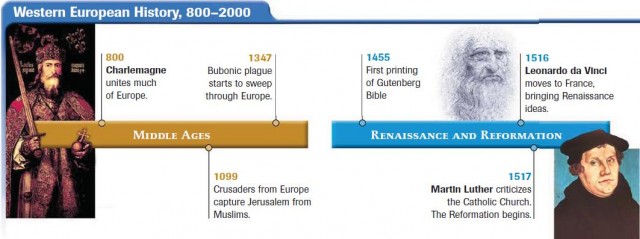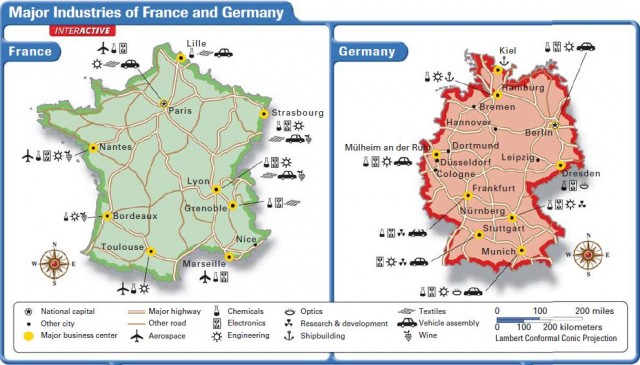Western Europe
A HUMAN PERSPECTIVE Today, the French call Emile Durkheim the father of French sociology (the study of society). But he wasn't always honored. During World War I, some French patriots considered him a disloyal foreigner. Why? Perhaps it was because he had a German last name and came from Lorraine, a region that had switched between French and German rule many times. France and Germany have long had a deep rivalry, based in part on cultural differences.
A History of Cultural Divisions
France and Germany are the dominant countries in Western Europe. They are the two largest countries, and their access to resources, ports, and trade routes helped them to build productive economies.
French culture is strong in France and Monaco; German culture is strong in Germany, Austria, and Liechtenstein. Switzerland and the Benelux countries of Belgium, the Netherlands, and Luxembourg have their own cultures—but also have been influenced by Germany and France. Western Europe's cultural divisions have historic roots.
ROME TO CHARLEMAGNE
One cultural division, language, dates from ancient times. By 50 B.C., the Roman Empire had conquered the Celtic tribes in what is now France. French is one of the Romance languages that evolved from Latin (Rome's language). But Rome never fully conquered the Germanic tribes that migrated into the lands east of France. Germanic languages are still spoken there.
In the late 700s, a Germanic king, Charlemagne, conquered most of the region. However, his empire began to fall apart soon after his death. Western Europe remained a region of small, competing kingdoms.

THE REFORMATION
A religious movement created new differences. During the Renaissance, scholars questioned authority. Some people even began to question the Catholic Church. In 1517, Martin Luther published 95 statements that criticized church practices that he believed were wrong. That began the Reformation, a period when many Christians broke away from the Catholic Church and started Protestant churches. Mutual hostility led Catholics and Protestants to fight religious wars that tore Europe apart.
Today, France is mostly Catholic. The Netherlands, Switzerland, and Germany contain both Protestants and Catholics. In Germany, Protestants live mainly in the north and Catholics in the south of the country.
The Rise of Nation-States
The period between the fall of Rome and the Renaissance is called the Middle Ages. During this time, Europeans gradually developed the nation-state, an independent nation of people with a common culture.
NATIONALISM
During the centuries after Rome fell, feudalism gradually developed in Europe. This was a political system in which powerful lords owned most of the land. They gave some land to nobles in exchange for military service by those nobles. Over time, strong kings gained power over feudal lords, and nationalism evolved. Nationalism is the belief that people should be loyal to their nation, the people with whom they share land, culture, and history.
Nationalism often causes groups to want their own countries, so it contributed to the rise of modern nation-states. France was one of the first nation-states. By the late 1600s, French kings held absolute power, which they often used to benefit themselves, not their people. In 1789, the people began a rebellion—the French Revolution. They deposed the king and formed a republic. But in a few years, an army officer named Napoleon Bonaparte seized power. In 1804, he made himself emperor. Napoleon tried to conquer all of Europe but was defeated.
The nation-states of Europe became strong rivals. From the 1600s to 1945, wars repeatedly broke out between France and Austria or between France and the German states (later Germany). Germany did not unify as a nation until 1871. It was one of many European countries affected by a new wave of nationalism in the 1800s.
Western Europe also experienced industrial growth in the 1800s. Industrialism caused European nations to set up colonies in other lands in order to gain raw materials and markets. Many European nations saw each other as rivals in the race to gain colonies. You will learn more about the effects of colonialism as you read this book.
MODERN CONFLICTS
The nationalistic rivalry and competition for colonies among European nations helped cause World War I. The Allied Powers (including France) fought the Central Powers (Germany, Austria-Hungary, and their allies). The Allied Powers won and imposed harsh terms on Germany. German resentment over those terms helped cause World War II, in which Germany, led by Adolf Hitler and the Nazis, tried to conquer Europe. The Nazis also carried out the Holocaust, a program of mass murder of European Jews and other minorities. In 1945, the Allies defeated Germany.
After the war, Germany was split into two nations. West Germany was allied with non-Communist Europe and the United States. East Germany was allied with the Communist Soviet Union. The capital city of Berlin, located in East Germany, was also divided, cut in two by the Berlin Wall. In 1989, anti-Communist reforms swept Europe, and in response to protests, East Germany opened the Berlin Wall.
In 1990, the two Germanys reunited under a democratic government. In recent years, France and Germany have tried to end the rivalry that so often led to war. These two nations were leaders in the movement toward establishing the European Union.
Economics: Diversity and Luxury
Since the Middle Ages, Western Europe has been rich in agriculture, and in the 1800s, it was one of the first regions to industrialize. The region's economy remains strong because it includes agriculture and manufacturing, plus high-tech and service industries.

AGRICULTURE TO HIGH-TECH
Dairy farming and livestock provide most of the agricultural income in Belgium, France, the Netherlands, and Switzerland. These countries produce and export dairy products. In addition, France is the largest producer of agricultural products in Western Europe. Its major crops include wheat, grapes, and vegetables. Western Europe was a leader in developing industry because it was rich in coal and iron ore. Today, the region has three of Europe's top manufacturing nations: France, Germany, and the Netherlands. The maps above show the major industries of France and Germany.
High-tech and service industries are also very important. Electronics is a major product of the Netherlands. Germany also produces electronics, as well as scientific instruments. France has one of the world's fastest passenger trains, the TGV (train a grande vitesse, or high-speed train), and a space program. France also relies heavily on nuclear energy. Nuclear plants produce nearly 75 percent of its electricity. Switzerland specializes in the service industry of banking. One reason for this is that Switzerland refuses to fight in wars, so people believe that money is safer there.
TOURISM AND LUXURY
Because of its varied scenery, mild climate, and historic sites,Western Europe is popular with tourists. Tourism is a major part of the French, Swiss, and Austrian economies.
Western Europe exports luxury goods to the world. For example, some German cars and Swiss watches are considered status symbols. France is famous for its high-fashion clothing and gourmet foods. The Netherlands exports high-quality flower bulbs, such as colorful tulips.
ECONOMIC PROBLEMS
One nation in the region, Germany, has had economic problems recently. When Germany reunified, the new nation faced difficulties because the West had a much higher standard of living. East Germany's factories were outdated compared with those in the West, and many shut down. Germany has been working steadily to foster growth in the former East Germany, but progress will take time. By 1998, the East produced only six percent of the nation's exports.
Great Music and Art
Each Western European country has a distinct identity, shaped in part by language and religion. Even with these differences, one thing is true of the region as a whole—it has a strong artistic legacy.
MUSIC
Germany and Austria are famous for music. Johann Sebastian Bach, who wrote music for church services, was German. So was Ludwig van Beethoven, who composed symphonies and other works. He wrote music even after going deaf. Austrian composers include Wolfgang Amadeus Mozart, who was a child genius.
PAINTING
France and the Netherlands have had many important painters. Jan Van Eyck was a painter from Flanders (a region now divided among France, the Netherlands, and Belgium) who perfected techniques for using oil paints. Jan Vermeer and Rembrandt were Dutch artists who painted with great realism. Major French painters include the impressionist Claude Monet and postimpressionists Paul Cezanne and Paul Gauguin, who paved the way for modern art.
Modern Life
Because of their strong economies, Western Europeans enjoy a high standard of living and generally can afford to buy material goods such as cars and computers. Most Western Europeans live in cities.
CITY LIFE
In general, Western European cities are interesting and pleasant places to live. Most have good public transportation systems. They offer many cultural attractions: movies, concerts, art galleries, and museums. Crime rates are lower than in the United States.
As a rule, Europeans live in smaller homes than Americans do. Because of this, they often socialize in public places. Friends might meet in cafes, sitting at outdoor tables if the weather is nice. Also, most cities have many lovely parks that their citizens regularly enjoy.
One difference between Western Europe and the United States is that Europeans receive more paid vacation time. For example, Germans have about 30 vacation days a year. Vacationing Europeans often leave the city to engage in outdoor activities like biking, hiking, or skiing.
RECENT CONFLICTS
In recent decades, immigration has been a source of conflict here. In the 1980s, increasing numbers of “guest workers” from Yugoslavia and Turkey came to West Germany for jobs. When the German economy declined, some angry Germans committed discrimination and even violence against immigrants. In response, millions of other Germans protested racism.
Austria has also faced tensions. Political leader Joerg Haider made controversial remarks that defended former Nazis and that immigrants found insulting. Many feared a rebirth of racist politics, so in 2000 Haider had to resign as party head—yet he remained a force in Austrian public life.
- Mediterranean Europe
- Europe: Human–Environment Interaction
- Europe: Climate and Vegetation
- Europe: Landforms and Resources
- European Communities
- A Geopolitical Region Where Major Powers Meet: The East, the West, an ‘In-Between’ Europe
- The Sustainable Rural Development Paradigm in Europe
- Early and High Medieval Europe
- European Union